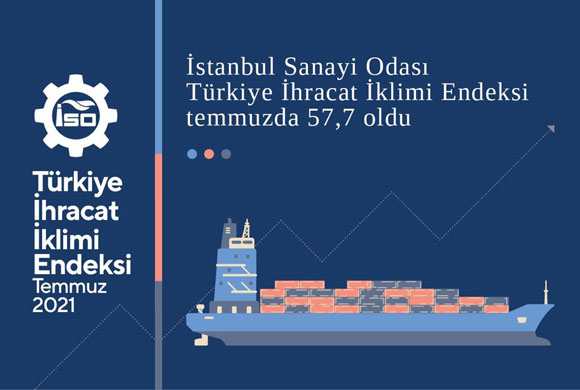News
Istanbul Chamber of Industry Türkiye Export Climate Index for July Released
- 09.08.2021
- News

Measuring the operating conditions in the key export markets of the Turkish manufacturing sector, the Istanbul Chamber of Industry (ICI) Türkiye Manufacturing Export Climate Index dropped to 57.7 in July, but still well above the 50.0 no-change mark to signal a sharp improvement in the export climate. Demand conditions in export markets have now improved in each of the past six months.
The key export markets for Turkish manufacturers are the US and a number of European countries. These markets all continued to see marked expansions of output during July. Germany, the largest single market for Turkish manufacturing exports, posted a record increase in growth rate, while Italy saw the strongest pace of growth in three-and-a-half years. There was a mixed picture across the Middle East. Sharp increases in activity were seen in Saudi Arabia, the UAE and Qatar, while Egypt posted a renewed decline. China and Brazil posted accelerations in the growth rates from those seen in June, while Russia saw the pace of expansion soften. India, meanwhile, signalled a near-stabilisation of business activity.
The Istanbul Chamber of Industry (ICI) Türkiye Manufacturing Export Climate Index, which measures the operation conditions in the key export markets of the Turkish manufacturing sector, announced the results of the index for July 2021. In the index, the figures above the 50.0 no-change mark signals an improvement in the export climate, while the figures below signals deterioration.
The Istanbul Chamber of Industry Türkiye Manufacturing Export Climate Index posted 57.7 in July, down from 58.5 in June but still well above the 50.0 no-change mark to signal a sharp improvement in the export climate. Demand conditions in export markets have now improved in each of the past six months.
The largest market Germany posts a record increase in growth
The key export markets for Turkish manufacturers are the US and a number of European countries. These markets all continued to see marked expansions of output during July. Germany is the largest single market for Turkish manufacturing exports, accounting for around 10% of exported goods. Germany posted a record increase while Italy saw the strongest pace of growth in three-and-a-half years. Other key export destinations all saw rates of expansion remain strong despite easing from June. These included the UK, the US, France, Spain and the Netherlands.
Mixed picture in the Middle East
There was a mixed picture in terms of demand conditions across the Middle East. Sharp increases in activity were seen in Saudi Arabia, the UAE and Qatar, with the UAE posting the fastest rise in non-oil output for two years. On the other hand, Egypt posted a renewed decline in activity, while Lebanon remained in contraction territory.
A number of countries saw steep declines in demand in July amid rising COVID-19 case numbers and associated restrictions which hampered operations. The most marked declines in activity were seen in Myanmar, Uganda, Malaysia, Indonesia and Vietnam. These markets combined account for just 0.5% of Turkish manufacturing exports, however, and so issues in those countries have little direct impact on the export climate for Turkish goods producers. Elsewhere, Mainland China and Brazil posted accelerations in the respective rates of growth from those seen in June, while Russia saw the pace of expansion soften. India, meanwhile, signalled a near-stabilisation of business activity following a sharp decline in June, again linked to the COVID-19 pandemic.
Commenting on the Istanbul Chamber of Industry Türkiye Manufacturing Export Climate Index, Andrew Harker, Economics Director, IHS Markit, said: “The rebound in activity across all of the key export markets for Turkish manufacturers continued in July, and this sustained growth should help exporters to secure sales over the months ahead. The COVID-19 pandemic is still a clear threat, however, and is currently causing sharp reductions in activity across a number of Asian markets. Although Turkish manufacturers aren’t particularly exposed to weakness in the affected markets, the potential impact on already stretched global supply-chains would be a cause for concern.”